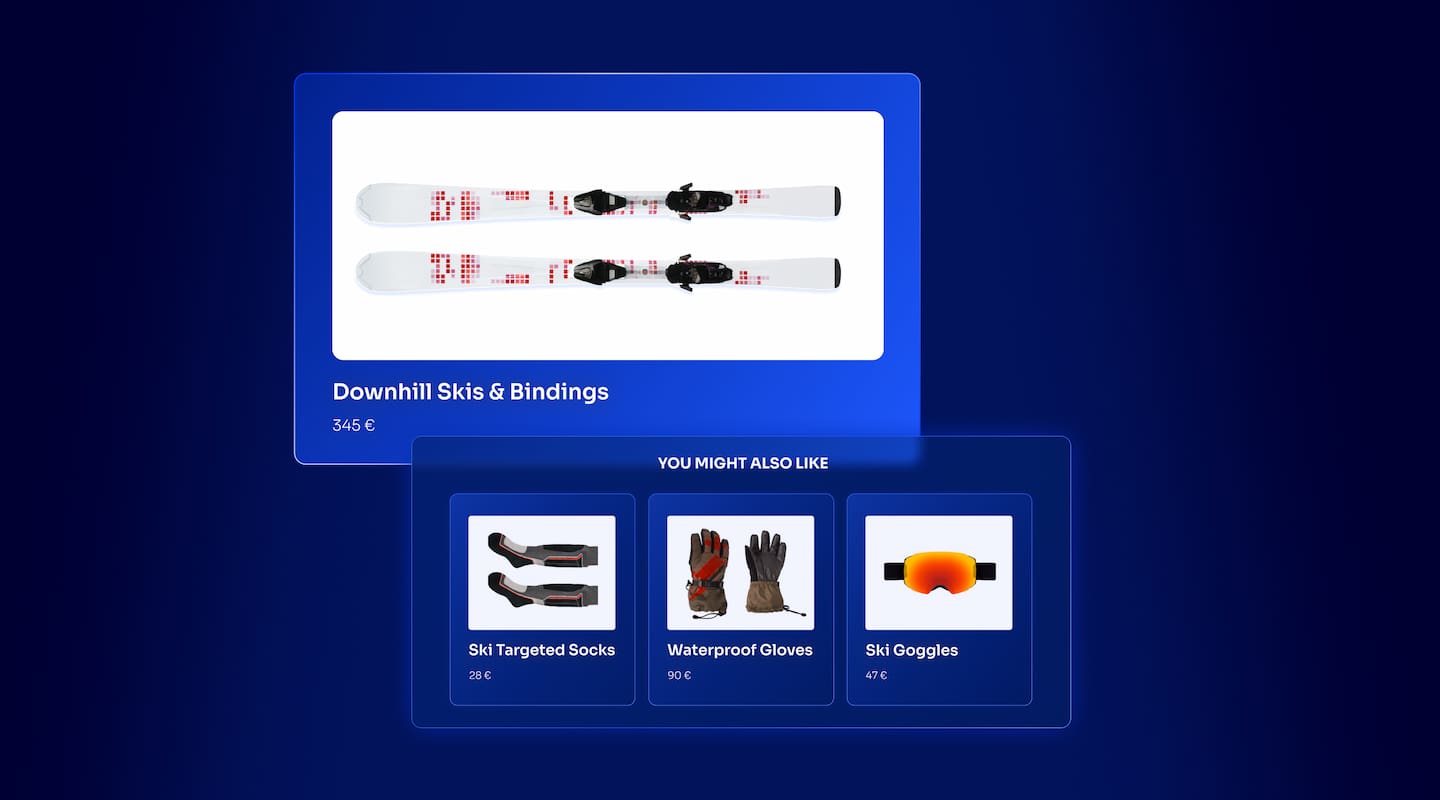Add InstantSearch and Autocomplete to your search experience in just 5 minutes
A good starting point for building a comprehensive search experience is a straightforward app template. When crafting your application’s ...
Senior Product Manager


A good starting point for building a comprehensive search experience is a straightforward app template. When crafting your application’s ...
Senior Product Manager

The inviting ecommerce website template that balances bright colors with plenty of white space. The stylized fonts for the headers ...
Search and Discovery writer

Imagine an online shopping experience designed to reflect your unique consumer needs and preferences — a digital world shaped completely around ...
Senior Digital Marketing Manager, SEO

Winter is here for those in the northern hemisphere, with thoughts drifting toward cozy blankets and mulled wine. But before ...
Sr. Developer Relations Engineer

What if there were a way to persuade shoppers who find your ecommerce site, ultimately making it to a product ...
Senior Digital Marketing Manager, SEO

This year a bunch of our engineers from our Sydney office attended GopherCon AU at University of Technology, Sydney, in ...
David Howden &
James Kozianski

Second only to personalization, conversational commerce has been a hot topic of conversation (pun intended) amongst retailers for the better ...
Principal, Klein4Retail

Algolia’s Recommend complements site search and discovery. As customers browse or search your site, dynamic recommendations encourage customers to ...
Frontend Engineer

Winter is coming, along with a bunch of houseguests. You want to replace your battered old sofa — after all, the ...
Search and Discovery writer

Search is a very complex problem Search is a complex problem that is hard to customize to a particular use ...
Co-founder & former CTO at Algolia

2%. That’s the average conversion rate for an online store. Unless you’re performing at Amazon’s promoted products ...
Senior Digital Marketing Manager, SEO

What’s a vector database? And how different is it than a regular-old traditional relational database? If you’re ...
Search and Discovery writer

How do you measure the success of a new feature? How do you test the impact? There are different ways ...
Senior Software Engineer

Algolia's advanced search capabilities pair seamlessly with iOS or Android Apps when using FlutterFlow. App development and search design ...
Sr. Developer Relations Engineer

In the midst of the Black Friday shopping frenzy, Algolia soared to new heights, setting new records and delivering an ...
Chief Executive Officer and Board Member at Algolia

When was your last online shopping trip, and how did it go? For consumers, it’s becoming arguably tougher to ...
Senior Digital Marketing Manager, SEO

Have you put your blood, sweat, and tears into perfecting your online store, only to see your conversion rates stuck ...
Senior Digital Marketing Manager, SEO

“Hello, how can I help you today?” This has to be the most tired, but nevertheless tried-and-true ...
Search and Discovery writer
In today’s post-pandemic-yet-still-super-competitive retail landscape, gaining, keeping, and converting ecommerce customers is no easy feat. However, some retailers more than others know the benefits of one proven merchandising strategy that’s beneficial for both companies and consumers alike: retail personalization.
By learning the preferences and needs of their individual online shoppers, retailers can create meaningful personalized experiences that instill loyalty and push conversion rates higher. With the personalization market projected to reach $2.7 billion by 2027, now’s a good time to review the benefits of retail personalization and how it can help your business.
Retail personalization is the practice of creating enjoyable shopping experiences that delight individual customers and reflect their preferences and interests. Online personalization utilizes data and insight gleaned about customers to deliver relevant targeted content, product recommendations, and offers across omnichannel touchpoints, including websites, mobile apps, email, and in-store experiences. By leveraging data analytics, retailers can create winning personalized customer experiences that resonate with potential buyers on a deeper level. The result? Personalization can drive higher retail customer satisfaction and sales.
Various techniques have been found to generate optimal results from personalization, including:
It’s all about gathering meaningful data on your shoppers’ behavior, demographics, purchase history, and preferences, starting with their first time on your site. By capturing and analyzing data from multiple sources (for example, conversations they’ve had with the chatbot and their browsing history), you can gain insight on their preferences, then optimize marketing strategies, product recommendations, and tailored offers accordingly.
For example, an online clothing retailer could collect data on a shopper’s previous purchases, noting their preferences in colors, styles, and patterns. The team could then create personalized recommendations and offers tailored with those preferences in mind. If blue-and-white stripes are their thing of the moment, item notifications with real-time offers for more blue-and-white striped items could land in their email in-box.
Categorizing shoppers in distinct customer segments allows you to more effectively roll out results-generating personalization. By assessing the segments within your customer base, you can create tailored online shopping experiences and offers that resonate with each group. For instance, a beauty products retailer might segment shoppers based on their age and skin type; it could then provide personalized product recommendations tailored to people’s particular skin-care needs.
“Frequently bought together” was once a novel phrase; now it’s part of the online shopping lexicon. Recommendation engines have played a starring role in that achievement. They use algorithms and machine learning to make uncannily on-target predictions that are likely to make a shopper happy. This can’t help but enhance shopping experiences. Whether people are looking at a category page, a product page, or the shopping cart page, it’s a proven upselling tactic.
For example, a photography ecommerce platform might use a recommendation engine to suggest complementary products based on a shopper’s previous purchases. If they buy a film camera (do those still exist?) for instance, the site might recommend accessories, lenses, and books about the art of film-camera photography.
Despite instant messaging’s popularity, email is still a viable marketing tool. When shoppers’ personal data is well utilized, you can generate well-tailored email content. For instance, an online store selling books might send a personalized email message recommending books from customers’ favorite genres or authors who’ve previously made showings in their purchase history. If they’ve bought books by Stephen King, they could get recommendations for Edgar Allen Poe or Susan Hill, for instance. It’s pretty obvious that this type of personalization can significantly increase your customer engagement and conversion.
From their arrival on your home page or a landing page, or their arrival in person to pick up purchased items at your brick-and-mortar store, all the way through browsing and checkout, regardless of the sales channel or channels they’ve elected to use, shoppers expect a cohesive journey. Your job: ensure that your personalization efforts consistently span your website, mobile app, physical store, social-media space, and any other applicable touchpoints.
For example, a retailer might offer personalized product recommendations on their website based on a shopper’s browsing history and conversations with a customer support chatbot. They might also seamlessly carry over the same look and feel to their mobile app, just in case the shopper decides to change from browsing in the physical store to scrolling on their mobile device to finish out their shopping journey.
What does good retail personalization look like? For inspiration, let’s check out what a few ecommerce juggernauts of the retail industry are doing:
Who hasn’t marveled at the amazing and ever-improving Amazon personalized shopping experience? This ecommerce giant expertly harnesses customer data to offer personalized product recommendations, tailored search results, and dynamic pricing based on customers’ browsing and purchasing behavior. 
Its state-of-the-art personalization always seems to be one step ahead of other retailers’ offerings. All we can say is that Amazon must be doing something (many things) right, as it’s worth around $1.42 trillion.
Among its personalization tools (such as tailored recommendations), this mainstream beauty retailer leverages augmented reality (AR) to enable shoppers to virtually try on makeup to see if the colors and look are right. Sephora’s personalized, interactive shopping experience is super convenient and allows people to make informed buying decisions without having to set foot in the retailer’s physical store. (And if they do set foot in the store, technology is an equally big help, as the sales associates can scan people’s skin with a wand to analyze it and produce all kinds of relevant recommendations just for them.

Is the color and consistency of a foundation brand that your friend loves the right choice for your skin tone as well? Is rosy pink lipstick a good match for your coloring? Sephora is a tough place to be on a budget, as all beauty-product questions can be answered with authority and all appropriate products can be confidently considered.
A similar conundrum exists if you’re an athletic shoe and clothing fanatic who likes the Nike brand. Nike’s mobile app, NikePlus, offers personalized recommendations to help shoppers find new products that align with their preferences and interests. That’s not all: the company uses data from the app to provide personalized training plans and content tailored to users’ fitness goals.

Whether shoppers want to adapt their training style or show off their physique, the app shows them great options.
Looking for a fun, economical way to have a personal shopper? Check out the novel Stitch Fix. This “online personal styling service” takes advantage of recommendation algorithms to curate personalized clothing recommendations for consumers according to their style preferences, measurements, and budgets.

The company sends shoppers clothing “fixes” tailored to their style preferences; they can try the items on and keep or send them back (free of charge). With continuing data collection that encompasses people’s preferences, measurements, and feedback on previous recommended items, Stitch Fix can then deliver more items that are likely to take up permanent residence in their customers’ closets.
This electronics retailer has embraced retail personalization through its “My Best Buy” loyalty program, tailoring personalized offers, recommendations, and rewards based on shopping behavior and preferences.

What’s not to love about a retail personalization feature that rewards loyal customers and encourages repeat purchases?
Sold on data-driven retail personalization for your ecommerce site yet? Here are some compelling reasons you might want to make robust personalization experiences a fundamental part of your ecommerce marketing campaign:
According to Salesforce (2022), 73% of consumers expect companies to understand their needs and expectations. It’s easy to understand why. Retail personalization creates a sense of shopper individuality and relevance, making prospective customers feel valued and understood, and thereby confident in the shopping choices they’re making.
You can cater to each shopper by providing “intuitively” personalized recommendations, offers they may find intriguing, and content that makes them feel like you “get” them and what they want. With the evolving state of personalization, now is definitely a great time to know thy customer as well as you can. The prospective payoffs: better levels of engagement, higher customer satisfaction, and improved customer loyalty.
Are your conversion numbers a little concerning? Never fear; retail personalization can give your site metrics a hefty boost by helping shoppers naturally discover products you’ve determined could align with their buying preferences.
The personal connections you form with retail shoppers related to their browsing and buying can lead to positive word of mouth and a stronger brand reputation that result in true market differentiation. This can in turn accelerate your growth even further. According to McKinsey, organizations that utilize personalization tactics can generate 40% more revenue. Money is certainly a good motivator when you’re an ecommerce site. And here’s another thing to keep in mind: if you don’t employ personalization tactics, there could be consequences. We know that’s a real possibility because 45% of consumers in one survey said that without personalization provided by a retail brand, they’d likely go shop somewhere else.
Your results with personalization may vary, but it’s a good bet that, more than anything else you can do in terms of marketing, personalization can put your retail business on the road to success by striving to meet your customer needs.
Ecommerce personalization fosters positive long-term customer relationships, meaning you can look forward to repeat sales and higher average order values, plus better retention. That’s another fact borne out by studies: 78% of shoppers say they repurchase from brands that supply personalized shopping experiences. When customers feel understood and valued, they’re of course going to be more likely to trust and stick with you, and even become outspoken advocates for your brand.
By leveraging your shopper data, employing the right personalization strategies, and adopting personalization best practices, for instance, in how you provide users with search results, you can unlock the full potential of personalized customer journeys and all the associated rewards.
You do need the right tools to make it happen. At Algolia, we’ve helped a ton of online retailers implement results-driven personalization — now powered by the latest artificial intelligence — to meet or beat their customer demands and improve their bottom lines, many very significantly.
Ready to give your ecommerce customers the personalized shopping sessions they’ve come to expect and that they certainly deserve? Itching to drive revenue by offering outstanding retail experiences? Contact us (or request a demo) to hear how our groundbreaking NeuralSearch technology can help your ecommerce business go above and beyond your next revenue milestone.
Senior Digital Marketing Manager, SEO
Powered by Algolia Recommend